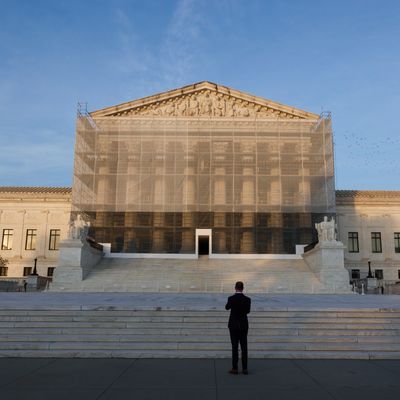
Another gift for the 47th president from his favorite court.
Photo: Kevin Carter/Getty Images
In a case that was ostensibly about the Trump administration’s radical effort to end birthright citizenship, the conservative majority of the U.S. Supreme Court took a major step toward restraining the power of federal district court judges to put a hold on executive-branch actions via “universal injunctions” that apply nationwide. Justice Amy Coney Barrett wrote the majority opinion in Trump v. CASA, in which the other five conservative justices concurred. It cut right to the chase: “Universal injunctions likely exceed the equitable authority that Congress has given to federal courts.” The decision provoked unusually bitter dissents from Justices Sonia Sotomayor (in which Justice Elena Kagan joined) and Ketanji Brown Jackson. It could represent the most significant decision of the current Supreme Court term, which ends today.
The decision did not address the constitutionality of the administration’s demand for an end to birthright citizenship, the principle that anyone born is this country is entitled automatically to U.S. citizenship. Instead, the Court focused on the real goal of Trump’s lawyers in pushing this case: to rein in the many federal district court judges around the country who are trying to slow down the administration’s efforts to expand presidential authority, in cases ranging from deportations without hearings to mass firings of federal employees to usurpation of congressional spending authority. (Indeed, Barrett’s opinion noted that 25 nationwide injunctions were issued by district court judges in the first 100 days of the Trump administration.) This has often been a footrace between the administration and the judges, with the Supreme Court being the ultimate destination of an extraordinary number of legal disputes. Now the Court has given Team Trump a big advantage: Parties seeking judicial relief from executive-branch overreach will have to plod through multiple district courts or undertake the complicated process of putting together class-action suits. Many legal observers who might generally agree that individual judges have on occasion overreached their authority will be alarmed by the timing and practical implications of the decision, which is a precious gift to Trump’s lawyers.
But rather than viewing this as an emergency brought on by Trump’s power grabs, Barrett chose to view the situation as the result of a long, slow, and largely unwarranted expansion of the power of judges to issue injunctions, which the Supreme Court is finally and appropriately addressing. That it happened to benefit the power-hungry president who placed her on the Court was incidental.
Sotomayor’s dissent expressed impatience with any interpretation of the majority’s position as a dry and technical matter of civil procedure:
No right is safe in the new legal regime the Court creates. Today, the threat is to birthright citizenship. Tomorrow, a different administration may try to seize firearms from law abiding citizens or prevent people of certain faiths from gathering to worship. The majority holds that, absent cumbersome class-action litigation, courts cannot completely enjoin even such plainly unlawful policies unless doing so is necessary to afford the formal parties complete relief. That holding renders constitutional guarantees meaningful in name only for any individuals who are not parties to a lawsuit. Because I will not be complicit in so grave an attack on our system of law, I dissent.
Justice Jackson upped the ante in her dissent:
It is important to recognize that the Executive’s bid to vanquish so-called “universal injunctions” is, at bottom, a request for this Court’s permission to engage in unlawful behavior. When the Government says “do not allow the lower courts to enjoin executive action universally as a remedy for unconstitutional conduct,” what it is actually saying is that the Executive wants to continue doing something that a court has determined violates the Constitution— please allow this. That is some solicitation. With its ruling today, the majority largely grants the Government’s wish. But, in my view, if this country is going to persist as a Nation of laws and not men, the Judiciary has no choice but to deny it.
Barrett took great umbrage at Jackson’s language, and indulged herself in an aside that will almost certainly be featured in conservative takes on the decision:
We will not dwell on Justice Jackson’s argument, which is at odds with more than two centuries’ worth of precedent, not to mention the Constitution itself. We observe only this: Justice Jackson decries an imperial Executive while embracing an imperial Judiciary.
That’s a bit rich given the conservative Supreme Court majority’s own remarkable willingness to exert its preemptive powers to give the administration a hand, as in the recent unsigned and silent order to let the federal government deport migrants to dangerous third parties without a hearing.
It’s unclear what the Supreme Court will ultimately do if and when the actual issue of birthright citizenship reaches the Court, along with the other sharp constitutional issues the Trump administration is creating with its authoritarian approach to the powers of the presidency. But it is very clear that in this and other cases, the Supreme Court has enhanced its own power and Trump’s, as well, at the expense of lower-court judges and the aggrieved parties that rely on the judiciary to slow down the runaway freight train of the 47th presidency.

